(完整版)初中英语动词分类讲解及练习(有答案)
最新中考英语动词分类讲解及练习(有答案)

中考英语动词分类讲解及练习(有答案)动词综合讲解一、实义动词■①及物动词与不及物动词根据后面是否带宾语,行为动词又可分为及物动词和不及物动词,及物动词。
Vt. vi .They study hard.I know them well.注:有的动词既可作及物动词,也可用作不及物动词。
如:She sings very well.She sang an English song just now.英语里有不少实义动词可以兼作及物动词和不及物动词Shall I begin at once?She began working as a librarian after she left school.When did they leave Chicago?They left last week.短语:■②动态动词和静态动词动态动词表示动作,如give, take, work, run等;静态动词表示感觉、情感、内心世界、相互关系等,如know, exist, be, have, appear, prove, concern, hate, dislike, like, love, surprise, include, depend on, belong to, guess, suppose,imagine, believe, doubt, admire, envy等。
■③延续性动词和非延续性动词根据动作是否延续,行为动词又分为延续性动词和非延续性动词。
如rain, live, work, learn等是延续性动词,go, come, leave, start, arrive, join, finish, end等是非延续性动词。
注:非延续性动词在肯定句中通常不与表示时间段连用的for短语连用。
如:[译]他离开这里三天了。
[误]He has left here for three days.[正]He has been away from here for three days.[正]He left here three days ago.[正]It’s three days since he left.■④限定动词与非限定动词限定动词在句中作谓语,有人称和数的变化。
(完整版)初中英语动词专项练习(含答案)100题

(完整版)初中英语动词专项练习(含答案)100题一、选择题1.When my mother knocked at the door, I ________ the latest magazine. A.read B.was reading C.had read D.would read 【答案】B【解析】【详解】句意:当我妈妈敲门时,我正在看最新的杂志。
考查时态辨析。
根据“When my mother knocked at the door”可知此处表示某事发生时另一件事情正在进行,从句用一般过去时,主句用过去进行时,其结构为was/were doing。
故选B。
2.If it rains tomorrow, we ________ at home.A.stayed B.stay C.were staying D.will stay【答案】D【解析】【详解】句意:如果明天下雨,我们就呆在家里。
考查动词时态。
if引导的条件状语从句,遵循主句用一般将来时,从句用一般现在时态,一般将来时的结构是will+动词原形,短语stay at home“呆在家”,故选D。
3.—Sorry, I’m afraid Dr. Johnson isn’t at his office now.—Well, I ________ him on his mobile phone instead.A.called B.have called C.will call D.is calling【答案】C【解析】【详解】句意:——抱歉,恐怕Johnson医生现在不在办公室。
——哦,那我给他打电话吧。
考查一般将来时。
call“打电话”,根据上文“I’m afraid Dr. Johnson isn’t at his office now”可知,找的人现在不在,所以将要给他打电话,用一般将来时,构成:主语+will+动词原形,故选C。
4.—Hi, Tom! _________ you ever _________ the Bird’s Nest?—Yes, I have. It’s fantastic.A.Have; been to B.Have; gone to C.Did; go to【答案】A【解析】【分析】【详解】句意:——嗨!汤姆!你去过鸟巢吗?——是的,我去过。
(完整版)初中英语动词专项练习(含答案)100题
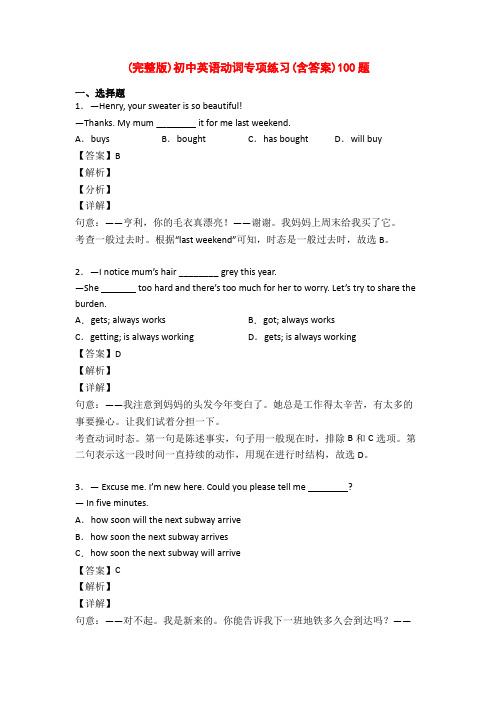
(完整版)初中英语动词专项练习(含答案)100题一、选择题1.—Henry, your sweater is so beautiful!—Thanks. My mum ________ it for me last weekend.A.buys B.bought C.has bought D.will buy【答案】B【解析】【分析】【详解】句意:——亨利,你的毛衣真漂亮!——谢谢。
我妈妈上周末给我买了它。
考查一般过去时。
根据“last weekend”可知,时态是一般过去时,故选B。
2.—I notice mum’s hair ________ grey this year.—She _______ too hard and there’s too much for her to worry. Let’s try to share the burden.A.gets; always works B.got; always worksC.getting; is always working D.gets; is always working【答案】D【解析】【详解】句意:——我注意到妈妈的头发今年变白了。
她总是工作得太辛苦,有太多的事要操心。
让我们试着分担一下。
考查动词时态。
第一句是陈述事实,句子用一般现在时,排除B和C选项。
第二句表示这一段时间一直持续的动作,用现在进行时结构,故选D。
3.—Excuse me. I’m new here. Could you please tell me ________?— In five minutes.A.how soon will the next subway arriveB.how soon the next subway arrivesC.how soon the next subway will arrive【答案】C【解析】【详解】句意:——对不起。
(完整版)初中英语动词专项练习(含答案)100题
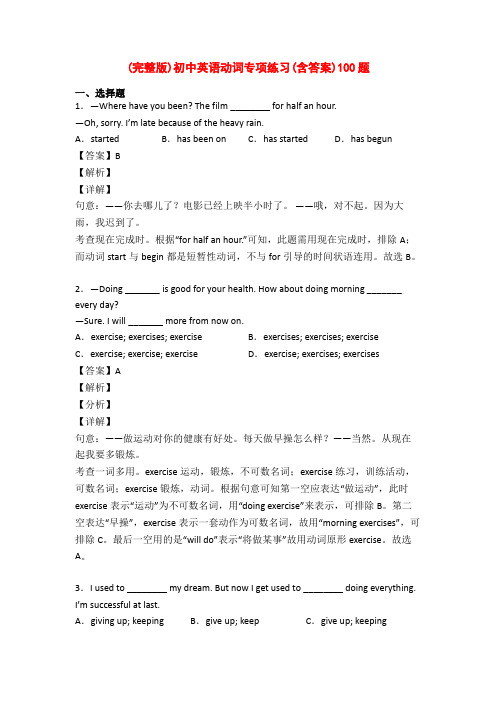
(完整版)初中英语动词专项练习(含答案)100题一、选择题1.—Where have you been? The film ________ for half an hour.—Oh, sorry. I’m late because of the heavy rain.A.started B.has been on C.has started D.has begun【答案】B【解析】【详解】句意:——你去哪儿了?电影已经上映半小时了。
——哦,对不起。
因为大雨,我迟到了。
考查现在完成时。
根据“for half an hour.”可知,此题需用现在完成时,排除A;而动词start与begin都是短暂性动词,不与for引导的时间状语连用。
故选B。
2.—Doing _______ is good for your health. How about doing morning _______ every day?—Sure. I will _______ more from now on.A.exercise; exercises; exercise B.exercises; exercises; exercise C.exercise; exercise; exercise D.exercise; exercises; exercises【答案】A【解析】【分析】【详解】句意:——做运动对你的健康有好处。
每天做早操怎么样?——当然。
从现在起我要多锻炼。
考查一词多用。
exercise运动,锻炼,不可数名词;exercise练习,训练活动,可数名词;exercise锻炼,动词。
根据句意可知第一空应表达“做运动”,此时exercise表示“运动”为不可数名词,用“doing exercise”来表示,可排除B。
第二空表达“早操”,exercise表示一套动作为可数名词,故用“morning exercises”,可排除C。
(完整版)初中英语动词专项练习(含答案)100题
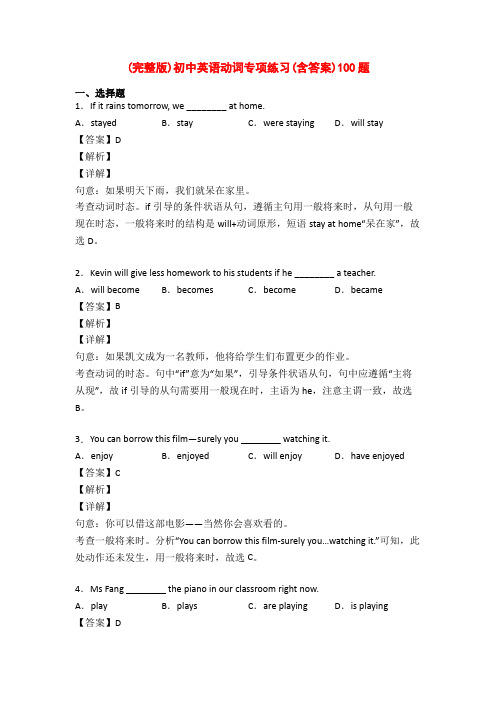
(完整版)初中英语动词专项练习(含答案)100题一、选择题1.If it rains tomorrow, we ________ at home.A.stayed B.stay C.were staying D.will stay【答案】D【解析】【详解】句意:如果明天下雨,我们就呆在家里。
考查动词时态。
if引导的条件状语从句,遵循主句用一般将来时,从句用一般现在时态,一般将来时的结构是will+动词原形,短语stay at home“呆在家”,故选D。
2.Kevin will give less homework to his students if he ________ a teacher.A.will become B.becomes C.become D.became【答案】B【解析】【详解】句意:如果凯文成为一名教师,他将给学生们布置更少的作业。
考查动词的时态。
句中“if”意为“如果”,引导条件状语从句,句中应遵循“主将从现”,故if引导的从句需要用一般现在时,主语为he,注意主谓一致,故选B。
3.You can borrow this film—surely you ________ watching it.A.enjoy B.enjoyed C.will enjoy D.have enjoyed 【答案】C【解析】【详解】句意:你可以借这部电影——当然你会喜欢看的。
考查一般将来时。
分析“You can borrow this film-surely you…watching it.”可知,此处动作还未发生,用一般将来时,故选C。
4.Ms Fang ________ the piano in our classroom right now.A.play B.plays C.are playing D.is playing【答案】D【详解】句意:方老师现在正在我们教室里弹钢琴。
考查动词时态。
英语动词分类讲解及练习(有答案)
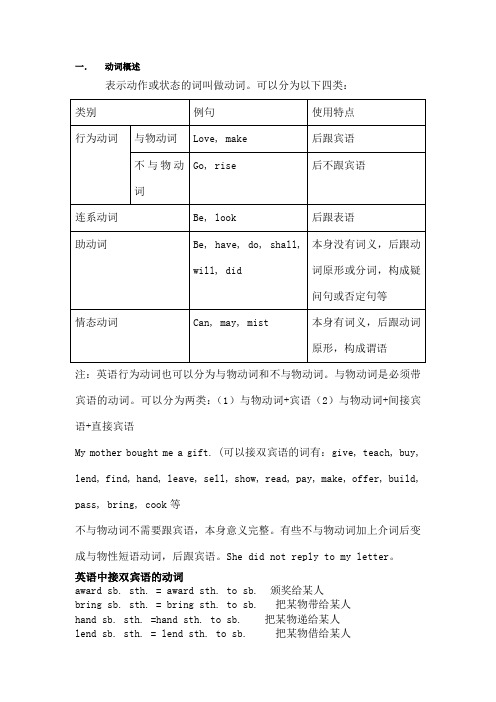
一.动词概述表示动作或状态的词叫做动词。
可以分为以下四类:注:英语行为动词也可以分为与物动词和不与物动词。
与物动词是必须带宾语的动词。
可以分为两类:(1)与物动词+宾语(2)与物动词+间接宾语+直接宾语My mother bought me a gift. (可以接双宾语的词有:give, teach, buy, lend, find, hand, leave, sell, show, read, pay, make, offer, build, pass, bring, cook等不与物动词不需要跟宾语,本身意义完整。
有些不与物动词加上介词后变成与物性短语动词,后跟宾语。
She did not reply to my letter。
英语中接双宾语的动词award sb. sth. = award sth. to sb. 颁奖给某人bring sb. sth. = bring sth. to sb. 把某物带给某人hand sb. sth. =hand sth. to sb. 把某物递给某人lend sb. sth. = lend sth. to sb. 把某物借给某人mail sb. sth. = mail sth. to sb. 把某物寄给某人offer sb. sth. = offer sth. to sb. 将某物给某人owe sb. sth. = owe sth. to sb. 欠某人某物pass sb. sth. = pass sth. to sb. 把某物递给某人pay sb. sth. = pay sth. to sb. 付给某人某物(钱)post sb. sth. = post sth. to sb. 把某物寄给某人read sb. sth. = read sth. to sb. 把某物读给某人听return sb.sth. = return sth. to sb. 把某物还给某人send sb. sth. = send sth. to sb. 把某物送给某人sell sb. sth. = sell sth. to sb. 把某物卖给某人serve sb. sth. = serve sth. to sb. 拿某物招待某人show sb. sth. = show sth. to sb. 拿某物给某人看take sb. sth. = take sth. to sb. 把某物拿给某人teach sb. sth. = teach sth. to sb. 教某人某物tell sb. sth. = tell sth. to sb. 告诉某人某情况throw sb. sth. = throw sth. to sb. 把某物扔给某人write sb. sth. = write sth. to sb. 给某人写信2、双宾语易位时需借助介词for的常用动词book sb. sth. = book sth. for sb. 为某人预定某物buy sb. sth. = buy sth. for sb. 为某人买某物choose sb. sth. = choose sth. for sb. 为某人选某物cook sb. sth. = cook sth. for sb. 为某人煮某物draw sb. sth. = draw sth. for sb. 为某人画某物fetch sb. sth. = fetch sth. for sb. 为某人去取某物find sb. sth. = find sth. for sb. 为某人找到某物fix sb. sth. = fix sth. for sb. 为某人准备某物get sb. sth. = get sth. for sb. 为某人拿来某物make sb. sth. = make sth. for sb. 为某人做某物order sb. sth. = order sth. for sb. 为某人订购某物pick sb. sth. = pick sth. for sb. 为某人采摘某物prepare sb. sth. = prepare sth. for sb. 为某人准备某物save sb. sth. = save sth. for sb. 为某人留某物sing sb. sth. = sing sth. for sb. 为某人唱某物(歌)spare sb. sth. = spare sth. for sb. 为某人让出某物steal sb. sth. = steal sth. for sb. 为某人偷某物3、有的动词后接的双宾语易位时,既可用介词to引出间接宾语,也可用介词for引出间接宾语,含义相同。
初中英语语法练习题 动词的分类和基本形式(带答案和解析)
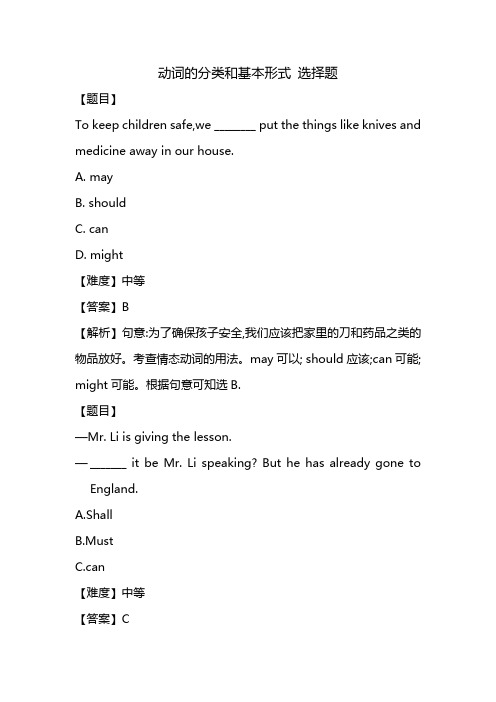
动词的分类和基本形式选择题【题目】To keep children safe,we ________ put the things like knives and medicine away in our house.A. mayB. shouldC. canD. might【难度】中等【答案】B【解析】句意:为了确保孩子安全,我们应该把家里的刀和药品之类的物品放好。
考查情态动词的用法。
may可以; should应该;can可能; might可能。
根据句意可知选B.【题目】—Mr. Li is giving the lesson.—_______ it be Mr. Li speaking? But he has already gone to England.A.ShallB.MustC.can【难度】中等【答案】C【解析】句意: —李老师正在上课。
—可能是李老师在讲课吗?可他已经去英国了。
本题考查情态动词的用法。
Shall应该;Must一定;can 可能。
由后面的“he has already gone to England”可知,前面说的是“可能是李老师在讲课吗”。
表示可能性的推测,使用情态动词can。
故正确答案为C项.【题目】—Some people don' t show their talents at the very beginning. —I agree. Even Einstein_______ read until he was seven.A. can'tB. mustC. couldn'tD. needn't【难度】中等【答案】C【解析】句意:—有些人在一开始时没表现出他们的天赋。
—我同意。
即使爱因斯坦也是到他7岁时才能阅读。
本题考查情态动词。
can't 不能; mustn't禁止; couldn't不能,can't的过去式; needn't不需要。
(完整版)初中英语动词专项练习(含答案)
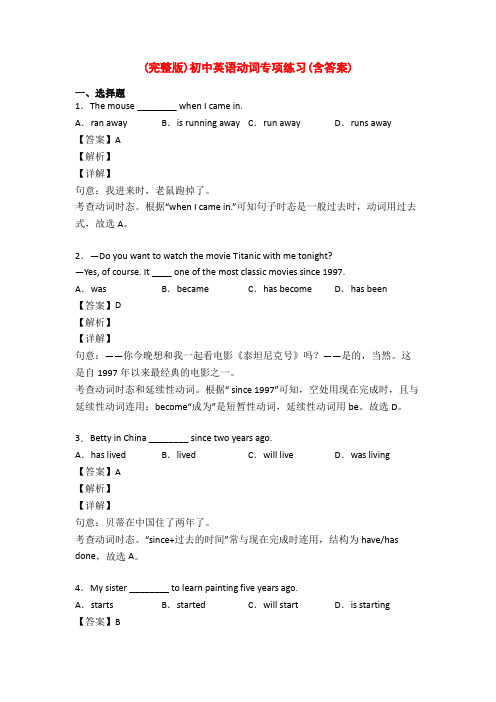
(完整版)初中英语动词专项练习(含答案)一、选择题1.The mouse ________ when I came in.A.ran away B.is running away C.run away D.runs away【答案】A【解析】【详解】句意:我进来时,老鼠跑掉了。
考查动词时态。
根据“when I came in.”可知句子时态是一般过去时,动词用过去式,故选A。
2.—Do you want to watch the movie Titanic with me tonight?—Yes, of course. It ____ one of the most classic movies since 1997.A.was B.became C.has become D.has been【答案】D【解析】【详解】句意:——你今晚想和我一起看电影《泰坦尼克号》吗?——是的,当然。
这是自1997年以来最经典的电影之一。
考查动词时态和延续性动词。
根据“ since 1997”可知,空处用现在完成时,且与延续性动词连用;become“成为”是短暂性动词,延续性动词用be。
故选D。
3.Betty in China ________ since two years ago.A.has lived B.lived C.will live D.was living【答案】A【解析】【详解】句意:贝蒂在中国住了两年了。
考查动词时态。
“since+过去的时间”常与现在完成时连用,结构为have/has done,故选A。
4.My sister ________ to learn painting five years ago.A.starts B.started C.will start D.is starting【答案】B【解析】【详解】句意:我妹妹五年前开始学绘画。
考查动词时态。
根据“five years ago”可知,本题是一般过去时,因此动词用过去式started。
- 1、下载文档前请自行甄别文档内容的完整性,平台不提供额外的编辑、内容补充、找答案等附加服务。
- 2、"仅部分预览"的文档,不可在线预览部分如存在完整性等问题,可反馈申请退款(可完整预览的文档不适用该条件!)。
- 3、如文档侵犯您的权益,请联系客服反馈,我们会尽快为您处理(人工客服工作时间:9:00-18:30)。
动词概述1、实义动词■①及物动词与不及物动词根据后面是否带宾语,行为动词又可分为及物动词和不及物动词,及物动词。
Vt. vi .They study hard.I know them well.注:有的动词既可作及物动词,也可用作不及物动词。
如:She sings very well.She sang an English song just now.英语里有不少实义动词可以兼作及物动词和不及物动词。
兼作及物动词和不及物动词时,不变。
试比较:Shall I begin at once?She began working as a librarian after she left school.When did they leave Chicago?They left last week.短语:■②动态动词和静态动词动态动词表示动作,如give, take, work, run 等;静态动词表示感觉、情感、内心世界、相互关系等,如know, exist, be, have, appear, prove, concern, hate, dislike, like, love, surprise, include, depend on, belong to, guess, suppose,imagine, believe, doubt, admire, envy 等。
■③延续性动词和非延续性动词根据动作是否延续,行为动词又分为延续性动词和非延续性动词。
如rain, live, work, learn 等是延续性动词,go, come, leave, start, arrive, join, finish, end 等是非延续性动词。
注:非延续性动词在肯定句中通常不与表示时间段连用的for 短语连用。
如:[译]他离开这里三天了。
[误]He has left here for three days.[正]He has been away from here for three days.[正]He left here three days ago.[正]It’s three days since he left.■④限定动词与非限定动词限定动词在句中作谓语,有人称和数的变化。
非限定动词有动词不定式、动名词和分词三种,也叫非谓语动词,没有人称和数的变化。
The room needs cleaning.二、连系动词系动词亦称连系动词,作为系动词,它本身有词义,但不能单独用作谓语,后边必须跟表语(亦称补语),构成系表结构说明主语的状况、性质、特征等情况。
系动词后不可接副词,接的是形容词。
Be:He is a teacher.(is 与补足语一起说明主语的身份。
)I am fine.2、keep, rest, remain, stay,例如:He always kept silent at meeting. 他开会时总保持沉默。
This matter rests a mystery. 此事仍是一个谜。
3、表示"看起来像"这一概念,主要有seem, appear, look, 例如:He looks tired. He seems (to be) very sad.4、feel, smell, sound, taste, 例如:This kind of cloth feels very soft. This flower smells very sweet.5、become, grow, turn, fall(asleep), get, go, come, run.He became mad after that. She grew rich within a short time.6、终止系动词。
表示主语已终止动作,主要有prove, turn out, 表达"证实","变成"之意,The rumor proved false. His plan turned out a success. (turn out 表终止性结果)7.使役动词:let,have,make 使,让…Let /make somebody do sthThe teacher lets/makes them clean the classroom after school.Make sb/sth adj.The story makes me happy. The color makes it look beautiful.Have somebody do sth 让某人做某事Have sth done 让某物被做My mother haves me make the bed. I have my hair cut/washed.有些动词它们既可以用作实义动词,又可以用作连系动词。
另外be 还可用作助动词。
它们的用法不同,词义和句型结构也有所不同。
例如:Look at the blackboard, please.请看黑板。
(look 用作实义动词)He looks a little tired.他略显疲倦。
(look 用作连系动词)They are at work.他们在工作。
(are 用作连系动词)They are working.他们正在工作。
(are 用作助动词,帮助构成现在进行时)3、助动词协助主要动词构成谓语动词词组的词叫助动词。
助动词是语法功能词,自身没有词义,不可单独使用,它没有对应的汉译,例如:He doesn't like English.(doesn't 是助动词,无词义;like 是主要动词,有词义)1、助动词be(is, am,are,was,were),have(has, had, having),do(did,does). *do(does, did) 的用法(1)构成疑问句或否定句(How) did you know ? He does not smoke.(2)加强语气。
He did tell that.Do come and see us.(3)代替前面刚出现的动词,避免重复。
-You like popular music, don't you? -Yes , I do.He speaks French as fluently as she does.(4)用于倒装句中。
Never did he pay attention to my words.Only then did I understand the importance of English.(5)构成否定的祈使句。
Don't be so careless.Do not hesitate to come for help.情态动词Can,could,may,might, shill,should, will,would,need,dear,have to, ought to. 1. Mr Wang be in Nanjing now, he went to Beijing only this morning.A. mustn’tB. may notC. can’tD. needn’t2.-Must I stay at home, Mum? --No, you .A.needn’tB. mustn’tC. don’tD. may not3.-Can you go swimming with us this afternoon?--Sorry, I can’t. I take care of my little sister at home because my mother is ill.A.canB. mayC. wouldD. have to4.-May I go to the cinema, Mum? --Certainly. But you be back by 11 o’clock.A.canB. mayC. mustD. need5.To make our city more beautiful, rubbish into the river.A.needn’t be thrownB. mustn’t be thrownC. can’t throwD. may not throw6.-May I go out to play basketball, Dad?--No, you . You must finish your homework first.A.mustn’tB. may notC. couldn’tD. needn’t7.-Where is Jack, please ? --He be in the reading room.A.canB. needC. wouldD. mustA. musn’tB. may notC. can’tD. needn’t8.-Mum, may I watch TV now?--Sure, but you help me with my housework first.A.canB. mayC. mustD. could9.The boy said he had to speak English in class, but he speak it after calss.A.couldB. didn’t have toC. mightD.shouldn’t10.John go there with us tonight, but he isn’t very sure a bout it.A.mustB. canC. willD. may11.Even the top students in our class can’t work out this problem.S o it be very difficult.A.canB. mayC. mustD. need12.It’s still early. You .A.mustn’t hurryB. wouldn’t hurryC. may not hurryD. don’t have to hurry13.A computer think for itself, it must be told what to do.A.can’tB. couldn’tC. may notD. might not14.-Could I borrow your dictionary? -- Yes, of course you .A.mightB. willC. canD. should15.I know your name?A.MayB. WillC. ShallD. Must16.I like to know where you were born.A.shallB. shouldC. doD. may17.you be happy!A.MightB. MustC. WishD. MayCADCB CACBD CDACA CDCDA CA。
